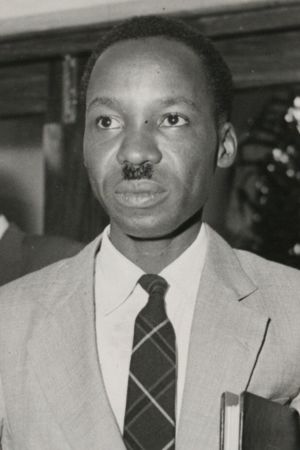Ujamaa facts for kids
Ujamaa, meaning 'familyhood' in Swahili, is a set of ideas developed by Julius Nyerere, the first President of Tanzania. These ideas are based on the traditional African way of life, where people lived and worked together as a large family.
Contents
Who Was Julius Nyerere?
Julius Nyerere (1922–1999) was a very important leader in Tanzania. He helped his country gain independence from British rule in 1961. After independence, he became Tanzania's first president. Nyerere believed in fairness and that everyone should have equal chances. He wanted to build a strong, united Tanzania where people helped each other. He was often called Mwalimu, which means 'teacher' in Swahili, because he taught his people about his ideas for a better society.
What Does Ujamaa Mean?
Ujamaa is all about 'familyhood' or 'community'. Nyerere believed that traditional African villages worked well because people shared what they had and supported each other. He wanted to bring this spirit of togetherness to the whole country. The main idea was that people should work together for the good of everyone, not just for themselves.
Key Ideas of Ujamaa
Ujamaa had several important principles:
- Sharing and Equality: Everyone should have a fair share of resources and opportunities. No one should be extremely rich while others are very poor.
- Self-Reliance: Tanzania should rely on its own people and resources, not on help from other countries. This meant growing their own food and building their own industries.
- Rural Development: Nyerere focused on improving life in villages. He encouraged people to live in collective villages called Ujamaa villages. In these villages, people would farm together and share the profits.
- African Socialism: Ujamaa is often called 'African socialism'. It was different from European socialism because it was based on African traditions of community and family, not on class struggles.
Why Was Ujamaa Created?
After Tanzania became independent, Nyerere faced a big challenge. Most people lived in poverty, and the country needed to develop quickly. He wanted to create a system that would help everyone, especially those in rural areas. He believed that Ujamaa would lead to a fairer and more equal society. He thought that by working together, Tanzanians could build a strong nation.
How Was Ujamaa Put into Practice?
To make Ujamaa happen, the Tanzanian government encouraged people to move into Ujamaa villages. In these villages, land was owned by the community, not by individuals. People worked together on farms and shared the harvest. The government also provided services like schools and health clinics in these villages. The goal was to improve farming methods and provide better services to rural communities.
Impact and Legacy of Ujamaa
Ujamaa had mixed results. It helped to unite the country and promote a sense of national identity. More people gained access to education and healthcare. However, moving people into Ujamaa villages was sometimes difficult, and not all villages were successful. Farming output did not always increase as much as hoped. Even though the Ujamaa policy officially ended in the 1980s, its ideas about self-reliance, community, and equality still influence Tanzania today. Nyerere's vision of a fair and united society remains an important part of Tanzania's history.
See also
 In Spanish: Ujamaa para niños
In Spanish: Ujamaa para niños
 | Lonnie Johnson |
 | Granville Woods |
 | Lewis Howard Latimer |
 | James West |


